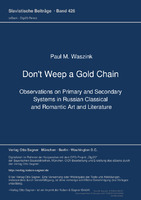Don't Weep a Gold Chain
Observations on Primary and Secondary Systems in Russian Classical and Romantic Art and Literature
Abstract
In this work I have endeavoured to apply the theory of primary and secondary systems as defined by D.S. Likhachev to Russian literary texts. Likhachev's idea amounts to the fact that those systems reoccur alternately. Thus, a primary system evolves into a so-called elliptic stage which enables a succeeding, secondary system to develop itself. Conversely, when the latter has become the standard norm it gradually evolves, in turn, into a similar elliptic stage. This, in turn, gradually develops into a primary system too. As far as the fluent succession of systems is concerned, Likhachev's theory differs from a similar theory developed by E.R. Curtius. The latter assumes that literary works should be divided into works with a Classicistic and a Manneristic character. The first develop into the latter which show a frozen character with no original qualities. In the end works with a new Classicistic character develop themselves. These, in turn, have a vital character again. In other words, in Curtius' scheme there is no place for a fluent alternation of systems the way there is in Likhachev's.
Keywords
Chain; Classical; Derzhavin's Poetry; Gogol; Gold; Literature; Mannerisms in Verbal and Pictorial Texts; Observations; Primary; Romantic; Russian; russian Realism; russian Romanticism; Secondary; Systems; Waszink; WeepDOI
10.3726/b12705ISBN
9783954790197OCN
1082953286Publisher website
https://www.peterlang.com/Publication date and place
Bern, 2003Series
Slavistische Beitraege, 426Classification
Linguistics


 Download
Download